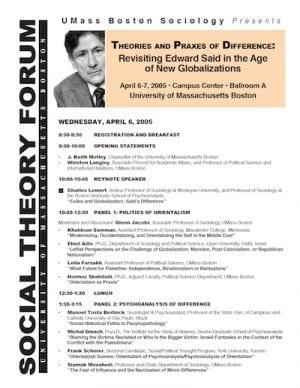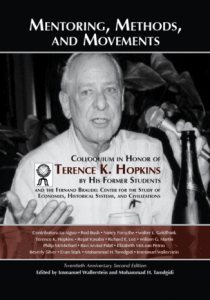Proceedings Journal Article — Orientalist and Liberating Discourses of East-West Difference: Revisiting Edward Said and the Rubaiyat of Omar Khayyam — by Mohammad H. Tamdgidi
$15.00
This paper revisits Edward Said’s text to demonstrate that underlying his political rhetoric regarding the orientalist dichotomizations of East and West is not a denial of the cultural difference itself but a critique of a particular (orientalist) way of dealing with that difference.
Description
Abstract
Through his writings, Edward Said exposed the underpinnings of the orientalist looking glass self images of the East in the mind of the West, and ushered a lively, sophisticated, and long lasting critical dialogue in our academic and public forums. Ironically, however, the discourse Said ushered may be misread to signify dismissal altogether of the substantive relevance and interpretive value of the East-West difference itself. The very process of critique of European imperiality and orientalism implies the expression and articulation of a subaltern, largely non-European, perspective that draws upon heritages that may have long preceded the rise of the West. This paper revisits Said’s text on the subject to demonstrate that underlying his political rhetoric regarding the orientalist dichotomizations of East and West is not a denial of the cultural difference itself but a critique of a particular (orientalist) way of dealing with that difference.
This paper argues that Said’s discourse on orientalism and the East-West difference needs to be itself historically contextualized in terms of the post-WWII and especially post-Cold War global conjuncture. I argue that a blanket dismissal of East-West difference may itself signify the internalized presence of a subtle eurocentricattitude in disguise that implicitly and indirectly reproduces the orientalist perspective by denying distinctive identity and power of representation to the non-European world. This is not to say that Said advocated such a perspective for he was well aware of the significance and value of post-colonial and subaltern literature seeking to rediscover and/or articulate authentic voices in the East; but the rhetorical form of hisarguments leaves room for misreading and misinterpretation of his otherwise valuable contributions in exposing the false orientalist representations in favor of authentic historiographies.
The distinctive contribution of Eastern world-view is its holistic and integrativeapproach to knowing the self and the world, an epistemological attitude that challenges the artificial disciplinary boundaries long invented and rigidified in Western cultural and academic discourse. However, neither the integrative nor the analytic modes of cultural production andinnovation as represented by Eastern and Western world-views can succeed in the absence, in opposition to, and in clash with the other. A dialectical conception of the East-West cultural difference, in fact, aims to accommodate both into a singular holistic framework whilemaintaining the distinctive contributions of each to the world culture. I will revisit Omar Khayyam’s rubaiyat to illustrate the way in which the very problem of “translating” his poetry invented and represented the orientalist discourse and how efforts in retranslating his quatrains can helpilluminate both the validity of East-West cultural difference and the articulation of liberating discourses of that difference.
Recommended Citation
Tamdgidi, Mohammad H. 2005. “Orientalist and Liberating Discourses of East-West Difference: Revisiting Edward Said and the Rubaiyat of Omar Khayyam.” Pp. 187-202 in Theories and Praxes of Difference: Revisiting Edward Said in the Age of New Globalizations: Proceedings of the Second Annual Social Theory Forum, April 6-7, 2005 (Discourse of Sociological Practice, Vol. 7, Issues 1&2, Fall/Spring 2005). Double-Issue Guest Editor: Mohammad H. Tamdgidi. Sociology Department, UMass Boston.
Read the Above Publication Online
You can read the above publication free-access online, by clicking the PDF icon below.








